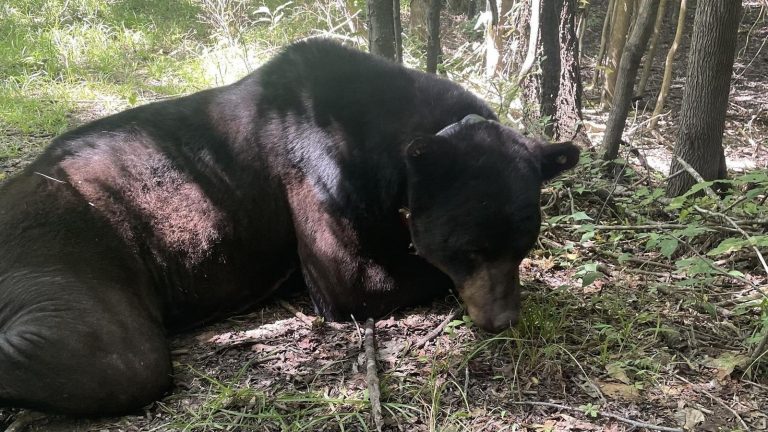A huge black bear designated M18 broke a record for heaviest bear in the history of the Black Bear … More
The Mississippi Department of Wildlife, Fisheries and Parks was over the moon with the discovery of a monster bruin this week. The 510-pound male black bear set a new record for MDWFP’s Black Bear Program. The researchers described it as “massive.” The bear handily eclipsed the previous heavyweight contender, a 468-pounder found as roadkill.
MDWFP posted a series of photos of the bear having a short nap while he was getting outfitted with a GPS tracking collar. Researchers posed with the bear, giving a sense of its size in comparison to adult humans.
Black Bear Program researchers pose with black bear M18, a record-breaker for the program.
Black bears in Mississippi
The Black Bear Program operates in partnership with Mississippi State University. The research program tracks bears and seeks to understand their movements, reproductive success and population density. This data feeds into conservation and wildlife management decisions. Black bears are classified as endangered in Mississippi. Overhunting and habitat loss contributed to a steep decline in black bears in the early 1900s.
The black bear population in the state was estimated to be less than 50 when the Black Bear Program started in 2002. The population now is estimated to be three times that number. “This population increase is due primarily to the recent appearance of female bears in our state, which led to the births of numerous cubs in the last several years—something not documented in Mississippi in the previous 40 years,” MDWFP said in an explainer.
The big bear is named M18. This isn’t his first brush with MDWFP. The team previously captured and collared him in 2022 when he weighed just 360 pounds. M18 may be smarter than the average bear. He was able to slip out of that first collar not long after he was first caught. “This recent capture provided an opportunity to safely gather current data as well as record his impressive growth before releasing him once again,” MDWFP said on social media. Talk about a glow-up.
Understanding black bears
Black bears roam across much of North America. Despite the name, they’re not always black. Some are brown or cinnamon in color. They have an omnivorous diet, so the Mississippi bear may have been packing on the pounds with a variety of different foods. Black bears typically eat fish, plants, nuts, fruit, insects and even animal carcasses.
While M18 broke the state program’s record, it’s not the biggest bear to ever lumber across the forest. Adult males typically weigh between 126 and 551 pounds, according to the United States Forest Service. Females typically come in much lighter. Black bears are the smallest of the North American bears. Compare this with brown bears, like the Fat Bear Week behemoths of Katmai National Park in Alaska. Those bulky brown bruins can top 1,200 pounds.
The Black Bear Program asks Mississippi residents to report black bear sightings. The program maintains a map showing where bears have been spotted. Big bear M18 was found in Sharkey County. The Delta National Forest covers a large area of the county.
Finding and tracking a big, healthy bear is a positive sign for the Black Bear Program and efforts to promote the recovery of the bear population in Mississippi. Black bears can live up to 30 years, so M18 may stay on the program’s radar for a long time to come. He may even get bigger and break his own record someday.





